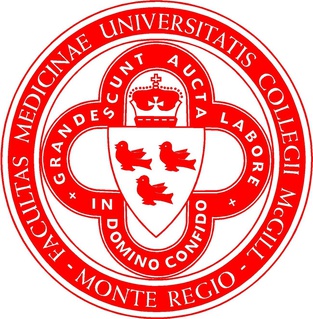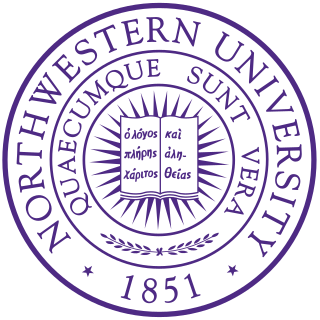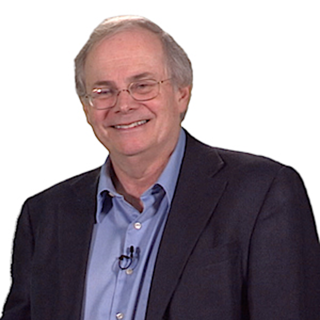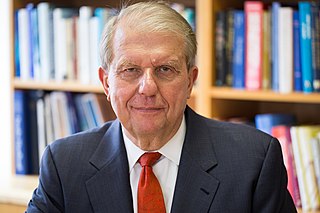
Stanley Ben Prusiner is an American neurologist and biochemist. He is the director of the Institute for Neurodegenerative Diseases at University of California, San Francisco (UCSF). Prusiner discovered prions, a class of infectious self-reproducing pathogens primarily or solely composed of protein, a scientific theory considered by many as a heretical idea when first proposed. He received the Albert Lasker Award for Basic Medical Research in 1994 and the Nobel Prize in Physiology or Medicine in 1997 for research on prion diseases developed by him and his team of experts beginning in the early 1970s.

The Faculty of Medicine and Health Sciences is one of the constituent faculties of McGill University. It was established in 1829 after the Montreal Medical Institution was incorporated into McGill College as the college's first faculty; it was the first medical faculty to be established in Canada. The Faculty awarded McGill's first degree, and Canada's first medical degree to William Leslie Logie in 1833.

The Feinberg School of Medicine is the medical school of Northwestern University and is located in the Streeterville neighborhood of Chicago, Illinois. Founded in 1859, Feinberg offers a full-time Doctor of Medicine degree program, multiple dual degree programs, graduate medical education, and continuing medical education.

The area postrema, a paired structure in the medulla oblongata of the brainstem, is a circumventricular organ having permeable capillaries and sensory neurons that enable its dual role to detect circulating chemical messengers in the blood and transduce them into neural signals and networks. Its position adjacent to the bilateral nuclei of the solitary tract and role as a sensory transducer allow it to integrate blood-to-brain autonomic functions. Such roles of the area postrema include its detection of circulating hormones involved in vomiting, thirst, hunger, and blood pressure control.

Vomiting is the involuntary, forceful expulsion of the contents of one's stomach through the mouth and sometimes the nose.

Gregory A. Petsko is an American biochemist and member of the National Academy of Sciences, the National Academy of Medicine, the American Academy of Arts and Sciences, and the American Philosophical Society. He is currently Professor of Neurology at the Ann Romney Center for Neurologic Diseases at Harvard Medical School and Brigham and Women's Hospital. He formerly had an endowed professorship in Neurology and Neuroscience at Weill Cornell Medical College and is still an adjunct professor of Biomedical Engineering at Cornell University, and is also the Gyula and Katica Tauber Professor, Emeritus, in biochemistry and chemistry at Brandeis University. On October 24, 2023, in a ceremony in the East Room of the White House, President Joe Biden presented Gregory Petsko and eight others with the National Medal of Science, the highest honor the United States can bestow on a scientist and engineer.
Yuan-Shih Chow, also known as Y. S. Chow or Zhou Yuanshen, was a Chinese and American probabilist. He was Professor Emeritus, Columbia University, United States.
David Der-wei Wang is a literary historian, critic, and the Edward C. Henderson Professor of Chinese Literature at Harvard University. He has written extensively on post-late Qing Chinese fiction, comparative literary theory, colonial and modern Taiwanese literature, diasporic literature, Chinese Malay literature, Sinophone literature, and Chinese intellectuals and artists in the 20th century. His notions such as "repressed modernities", "post-loyalism", and "modern lyrical tradition" are instrumental and widely discussed in the field of Chinese literary studies.

Howard Goldblatt is a literary translator of numerous works of contemporary Chinese fiction, including The Taste of Apples by Huang Chunming and The Execution of Mayor Yin by Chen Ruoxi. Goldblatt also translated works of Chinese novelist and 2012 Nobel Prize in Literature winner Mo Yan, including six of Mo Yan's novels and collections of stories. He was a Research Professor of Chinese at the University of Notre Dame from 2002 to 2011.

Shu Chien is a Chinese–American physiologist and bioengineer. His work on the fluid dynamics of blood flow has had a major impact on the diagnosis and treatment of cardiovascular diseases such as atherosclerosis. More recently, Chien's research has focused on the mechanical forces, such as pressure and flow, that regulate the behaviors of the cells in blood vessels. Chien is currently President of the Biomedical Engineering Society.

Ko Kuei Chen was a Chinese-American scientist who led pharmacological research at Eli Lilly and Company for 34 years. He is known for his work with ephedrine, cyanide poisoning therapy, and toad venom steroids. He was elected an inaugural member of Academia Sinica in 1948 and awarded the Remington Medal in 1965 for excellence in pharmacy.

Leo M. Chalupa is a Ukrainian-American Neuropsychologist who was Vice President for Research and is Professor of Pharmacology and Physiology at George Washington University. He was previously a Distinguished Professor of Ophthalmology and Neurobiology at the University of California, Davis and Chairman of the Department of Neurobiology, Physiology and Behavior where he also served as the Director of the UC Davis Center for Neuroscience and Interim Dean of the College of Biological Sciences.

Phyllis M. Wise is a biomedical researcher. Most recently, she is serving as the inaugural Chief Executive Officer and President of Colorado Longitudinal Study.

Jason X.-J. Yuan is an American physician scientist whose research interests center on pulmonary vascular pathobiology and pulmonary hypertension. His current research is primarily focused on the pathogenic mechanisms of pulmonary vascular diseases and right heart failure.
Robert Porter was a neurosurgeon in California. Porter was a founding member of the Brain Research Institute. He became Professor of Neurological Surgery at the University of California, Irvine, College of Medicine in 1969, and was Professor Emeritus there.
Arnold Richard Kriegstein is a neurologist and neuroscientist at the University of California, San Francisco, where he served as director of the UCSF Eli and Edythe Broad Center of Regeneration Medicine and Stem Cell Research from 2004 to 2021. His main research interests include neural stem cell and brain development. He is a member of the National Academy of Medicine.
Mamie Kwoh Wang was a director and vice-president of the American Bureau for Medical Advancement in China Inc (ABMAC). She was also a professor at the Cornell School of Nursing and helped develop the training program for nurse practitioners.
Liu Kwang-ching, who sometimes published under the name K.C. Liu, was a Chinese-born American historian of China. He taught at University of California-Davis from 1963 until his retirement in 1993. He is best known for his scholarship in late-Qing history, astute bibliographical work, and edited volumes, including co-editing Cambridge History of China volumes.
William Frederick Windle was an American anatomist and experimental neurologist.












